Search
Search Results
-
Stimulating Mechanistic Reasoning in Physics Using Student-Constructed Stop-Motion Animations
This article reports on a case study that aims to help students develop mechanistic reasoning through constructing a model based stop-motion...

-
Distinctive Aspects of Reasoning in Statistics and Mathematics: Implications for Classroom Arguments
Reasoning plays an important role in mathematics and statistics, but the kinds of reasoning used to establish results differ between mathematics and...
-
Medical Students’ Clinical Reasoning During a Simulated Viral Pandemic: Evidence of Cognitive Integration and Insights on Novices’ Approach to Diagnostic Reasoning
IntroductionCognitive integration from multiple disciplines is essential to clinical problem-solving. Because it is not directly observable,...
-
Exploring students’ science motivation across grade levels and the role of inductive reasoning in science motivation
The purpose of this study is to explore students’ motivation towards science learning at different grade levels and to investigate whether inductive...

-
Causal Map** as a Teaching Tool for Reflecting on Causation in Human Evolution
Teleological reasoning is viewed as a major hurdle to evolution education, and yet, eliciting, interpreting, and reflecting upon teleological...

-
Ethics, Education, and Reasoning
Methods based on ‘technical’ skills assessable on objective standards do not suffice to form critical abilities. Following contemporary virtue...
-
Early childhood mathematical development: the association between patterning and proportional reasoning
Insight into early precursors of proportional reasoning is necessary to further our theoretical understanding of mathematical development and to...

-
The use of scaffolding to promote preschool children’s competencies of evidence-based reasoning
Scientific reasoning encompasses individuals‘ evaluation of evidence with regard to a given hypothesis. In this study, we investigated whether...

-
Reasoning in Research
After doing several experimentsBernard Shaw, George and carefully analysing the observations recorded, scientists come to certain conclusions. For...
-
Examining Domain-General Use of Reasoning Across Science and Mathematics Through Performance on Standardized Assessments
The focus on STEM has centered on knowledge use across multiple disciplines. However, there currently exists limited understanding of the...

-
An Interdisciplinary Approach to Investigate Preschool children’s Implicit Inferential Reasoning in Scientific Activities
The implementation of Science, Technology, Engineering, and Mathematics (STEM) at school is one of the challenges of education in the twenty-first...

-
Covariational Reasoning – Theoretical Background
Covariational reasoning surfaced in the first chapters of the book, however, it needs more elaboration as it will dominate the case studies included...
-
Third-graders’ predictive reasoning strategies
This paper describes elementary students’ awareness and representation of the aggregate properties and variability of data sets when engaged in...

-
Develo** computer-aided diagramming tools to mine, model and support students’ reasoning processes
Despite the last 40 years of research showing that computer-aided diagramming tools improve student learning, very little research reveals the...

-
A System to Identify Young Children’s Reasoning About Variations Within Populations
This chapter reports on the design of a teaching intervention and an interview protocol that aims at exploring young children’s reasoning about the...
-
In search of the mechanisms that enable transfer from spatial reasoning to mathematics understanding
Spatial reasoning, the ability to mentally represent and transform objects and their relations, is considered so closely connected to mathematics...

-
The Thinking Frames Approach: Improving High School Students’ Written Explanations of Phenomena in Science
Secondary school students find it difficult to write elaborated causal explanations of scientific phenomena. They frequently present their own...

-
Towards a framework for spatial reasoning and primary mathematics learning: an analytical synthesis of intervention studies
The connection between spatial reasoning and mathematics learning and pedagogy in primary school children has been the subject of an increasing...

-
Biological Reasoning According to Members of the Faculty Developer Network for Undergraduate Biology Education: Insights from the Conceptual Analysis of Disciplinary Evidence (CADE) Framework
Educators who engage students in biology investigations aim to help them understand biology as a professional discipline. This includes understanding...
-
A layered analysis of self-explanation and structured reflection to support clinical reasoning in medical students
Self-explanation and structured reflection have been studied independently with results suggesting that both learning interventions can effectively...

